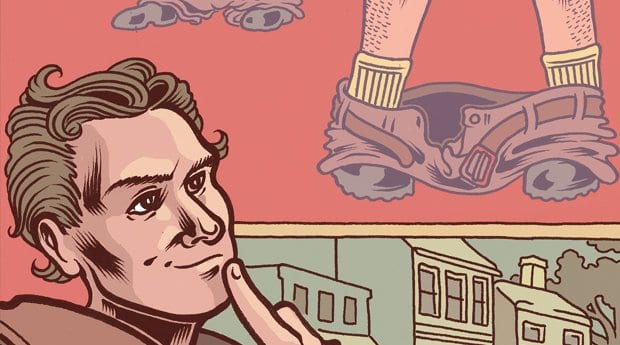Despite the bone-chilling late-November night, a large group gathers beneath the Alexander Wood statue at the corner of Church and Alexander streets. There to remember San Francisco supervisor and activist Harvey Milk on the 35th anniversary of his assassination are local activists, a city councillor, a Broadway star, Ontario’s openly lesbian premier and two drag-queen nuns. The convergence of past, present and future is truly awe-inspiring. In one speech, however, the name of Alexander Wood is invoked as a kind of early-day gay hero, which confuses me. I thought Wood was a landowner persecuted for sexual misconduct in the colonies. Turns out there is a lot about Wood I didn’t know.
Scottish merchant Alexander Wood arrived in Canada in 1793, first helping to set up a brewery in the town of Kingston before continuing on to York, which would later become Toronto. Wood created a successful import-export business, selling European luxuries widely unavailable in the colonies while exporting products, including flour, to the continent.
The province of Upper Canada, British-controlled colonial land that included what is now southernmost Ontario and Quebec, was run by a close-knit group of men who held most of the legal, political and financial power. Wood managed to beguile his way into the graces of the strongly classist Family Compact, becoming close with William Dummer Powell, an American-born Loyalist lawyer, among other Upper Canadian elite. He was also awarded several affluent judicial positions.
In 1810, word spread about Wood’s search for the man who had raped a woman named Miss Bailey. She had apparently scratched the genitals of her attacker, and Wood took it upon himself to call in several suspects, one by one, and inspect the young men for evidence. As Miss Bailey was likely fictitious, the incident caused a scandal that sunk Wood’s social standing and business. Evidence of the misconduct was submitted to a prosecutor but suppressed due to the “odious nature” of the transgression. Silence, after all, was the strategy to stonewall any spread of homosexual sex or love, so it was agreed that Wood would leave Canada and never return.
Wood defied the latter condition, returning in 1812 after the American invasion. He took up his previous positions, including that of magistrate, and resumed most of his friendships. Powell, now serving on Upper Canada’s executive council, was Wood’s sole antagonist. Wood returned to Scotland briefly after inheriting his family’s estate but returned in 1821, closed his business, which had never recovered after the scandal, and spent much of his remaining life as a manager for absentee landowners in the growing settlement.
By 1823, Wood sat on many commissions and Powell had been appointed chief justice of Upper Canada. When Wood was named to the war claims commission, Powell refused to swear in his former friend on moral principle. Wood sued Powell for damages and won £150, what would amount to approximately $10,000 today. Instead of paying, Powell published a pamphlet detailing the decades-old scandal, though this wouldn’t have been news for York. This time silence was on Wood’s side, and his ongoing service to the community made him a sympathetic figure. When Powell died, his debt was passed on to his widow. Wood eventually forgave the debt.
Wood bought a great deal of property in 1826, in what’s now downtown Toronto, though this land went mostly undeveloped until after his death. His nickname, “Molly Wood” (molly being an insult for homosexuals at the time), meant the land became known as “Molly Wood’s Bush.” He returned to Scotland in 1842 for a visit, but remained there until his death two years later. His Canadian land passed on to distant relatives and eventually became the Church-Wellesley Village.
I drew much of this information from my favourite LGBT history resource, historian Hamish Copley’s The Drummer’s Revenge. On the scandal that kept Wood alive in public memory, Copley writes, “It’s become increasingly fashionable to claim that the rumours were made up by Wood’s enemies. Between homophobes on one side who’ve tried to erase homosexuality from Canadian history, and gay activists on the other who’ve tried to turn Wood into some kind of hero, Wood has been portrayed as a victim of a whisper campaign.” Wood’s statue is worth a visit; not as a monument to a hero or villain, but to a man as fallible or perverse or prone to goodness as the rest of us.
Go to dailyxtra.com for an interview with Del Newbigging, the sculptor who created the Alexander Wood statue.


 Why you can trust Xtra
Why you can trust Xtra


